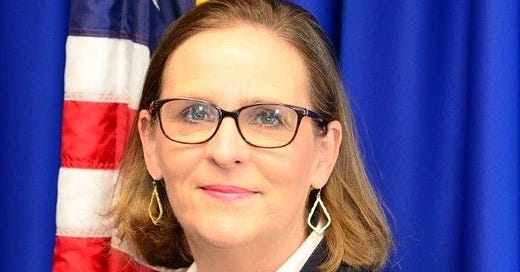Will angst over abortion rights tank a state Supreme Court nomination?
Red Meat For Mushy Moderates
Should the nomination of a federal prosecutor to the Connecticut Supreme Court be derailed because she signed a letter in support of current U.S. Supreme Court Justice Amy Coney Barrett to become a federal appeals court judge?
It certainly looks like such will be case for Sandra Slack Glover, who currently serves as chief of the appellate unit of the U.S. Attorney’s Office in Connecticut. Her nomination to the state’s highest court by Gov. Ned Lamont now appears in jeopardy because Glover, along with 30 other U.S. Supreme Court law clerks, signed a letter endorsing Barrett’s appointment to the federal bench in 2017, long before she was appointed to the high court and voted to overturn Roe V. Wade in last year’s so-called Dobbs decision.
It’s worth taking a look at the text of the letter itself, which can be found here on the website of the University of Notre Dame Law School, Barrett’s alma mater. The signees praised her work ethic, her legal abilities and her professionalism.
“She is smart, honorable, and fair-minded; all good qualities for a Circuit Court Judge,” the lawyers wrote, adding that Barrett was “eminently qualified” to serve as a appeals court judge.
The letter was signed by former clerks to liberal and conservative justices alike, including Sandra Day O’Connor, the widely respected moderate for whom Glover clerked in 1998. Glover, who has never served as a judge, is a 1997 graduate of the University of Chicago Law School with highest honors and was an editor of the law review.
In testimony before the General Assembly’s Judiciary Committee this week, Glover was questioned about both the letter and Dobbs, a decision that she called “egregiously wrong.” Glover, who characterized herself as staunchly pro-abortion rights, essentially disavowed the letter.
“I thought lower court judges were constrained. I thought the Supreme Court was constrained,” she told the committee. “I was wrong. And looking back and knowing what I now know, I shouldn’t have signed it.”
Fair enough. She made a mistake and owned up to it. I can relate. As a boss, I once recommended an employee for a job I thought they were qualified for, only to find out later that the new position was not a good fit. In that case, I apologized to the new employer, an old friend of mine, for recommending the worker. To this day, I still feel bad about it, though my friend graciously forgave me.
So the central question seems to be: should a lawyer endorse an otherwise qualified candidate for a federal judgeship if that candidate’s views on the law differ from hers? It’s worth noting that the signees of the letter did not say that they admired Barrett’s judicial philosophy or her views on issues that might come before the court. I disagree with Barrett’s originalist philosophy, but I do believe originalists should be represented on the court.
Things look grim in the General Assembly, where Democrats are balking in the face of opposition from abortion rights advocates. But I must say this really strikes me as much ado about very little. Even if Glover were inclined to vote unfavorably on the matters concerning abortion rights (which I think is highly unlikely), Roe v. Wade is has been codified in state law since 1990, so even if she wanted to, there’s little Glover could do to change abortion laws in a state that overwhelmingly supports abortion rights.
Others are questioning whether Glover is qualified to serve on the highest court in the state because she has never previously served as a judge. Nonsense. Longtime observers might recall the case of current Justice Andrew J. McDonald, a gay former Democratic state senator who had never sat on the bench, was attacked unfairly by the Family Institute of Connecticut and now ably serves the state Supreme Court (I endorsed his nomination in a 2013 CTNewsJunkie op-ed).
And as I wrote in that column: In perhaps the most prominent case of a justice who lacked experience, “When he was nominated by President Dwight Eisenhower to be chief justice of the United States, former California Gov. Earl Warren had never been a judge. Agree with him or not, but Warren went on to amass one of the most impressive judicial legacies of anyone to serve on the Supreme Court.”
That said, despite Lamont’s assurances that he stands behind her, Glover is probably toast — yet another casualty of the Dobbs decision and the impassioned emotions it kindled.





